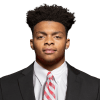2021 NFL Draft: Biggest questions facing top QB prospects? League executives, scouts weigh in
For the second consecutive year, the COVID-19 pandemic has turned the NFL draft evaluation process on its head — and no position is more difficult to figure out over Zoom than quarterback.
No league-wide gathering in Indianapolis for the NFL Scouting Combine. No private workouts or visits or dinners. No sitting down to watch tape, except on video calls, provided the prospect’s Wi-Fi is strong enough to handle the stream. The only in-person interactions permitted under the NFL’s updated COVID rules are at all-star games and pro days, if the school permits the latter. Most of the top QB prospects don’t even plan to do timing or testing at those pro days, instead focusing solely on their throwing sessions and leaving normally thorough scouts with a bunch of unchecked boxes.
But those Zoom sessions are already well underway. And as pro days kick into high gear this week, a consensus has emerged on the favorites to go No. 1 (Clemson’s Trevor Lawrence) and No. 2 (BYU’s Zach Wilson) overall, while three other quarterbacks — Ohio State’s Justin Fields, Alabama’s Mac Jones and North Dakota State’s Trey Lance — are considered good bets to land in Round 1, too. (Some other big names, such as Florida’s Kyle Trask, are considered a notch below as potential Day 2 picks.)
Teams have all the game tape (even if many coaches haven’t dug into it yet). Area scouts have spoken to everyone they can find (even if they may never shake the player’s hand). So, what’s left to figure out?
Here’s a look at the biggest questions facing each of those top five QBs, based on recent conversations with veteran evaluators across the NFL, from decision-makers to area scouts. Players are listed alphabetically.
How ready is he for the NFL game? The Buckeyes’ offense is known to limit how much the quarterback has to read, and Fields’ tape leaves questions about how quickly he processes once the ball is snapped and the picture changes. “It’s all the full-field read stuff and making decisions, just quickening up the pace,” an AFC scout said of Fields, 22. “He’s one of those pre-programmed guys: When it’s clean and everything’s there, it’s easy for him. And he’s got arm talent. He can spin it deep. But it’s more blitz recognition and just seeing it. He’s such a reactionary guy — ‘You do this to me, I’m going to do this to you’ — where he’s gotta wait, see it, make a hellacious play and prolong it.” Former NFL quarterback John Beck — who is working with Fields and several other QBs in this year’s draft — told me he’s not surprised scouts have questions off Fields’ tape, since Fields at times seems to opt for the harder throw or just start running around. But that doesn’t take into account how Fields has been taught to read the play out, Beck said, pointing to a play from the Indiana game that he discussed with Fields, who looked for the deep shot and then scrambled rather than hitting the 5-yard under route. “It’s not him being inefficient — it’s him being coached to do that,” Beck said. “He’s a smart kid. When I explain things, he gets it.” It’s not uncommon for modern college QBs to lack experience making NFL reads, whether they’re coming from Air Raid-type systems (Patrick Mahomes, Baker Mayfield, Kyler Murray, et al.) or offenses with pro concepts that lean on a QB’s playmaking talents (Lamar Jackson). And NFL offenses are evolving, too. Fields is so physically talented that some team surely will come up with a plan to cover up whatever weaknesses he has. In fact, multiple NFL executives argue that Fields, not Trevor Lawrence, is the more natural fit for the offense preferred by new Jaguars coach Urban Meyer — the former Ohio State coach who has the No. 1 overall pick. “It’s just going to require a commitment to an offensive system that’s going to tailor to his strengths,” an AFC executive said. “Asking him to drop back and read it and go through progressions — you’re asking for disappointment. But if it’s zone read, if it’s a lot of single, half-field reads with a run component built into it where, if it’s not there, he just pulls it down and goes — he’s close to as talented as those other two guys (Lawrence and Zach Wilson).”
What kind of leader will he be? People who have spent time around Fields say he can come across as quiet. And there were questions after his transfer from Georgia in 2019 about how well he related to teammates in an Ohio State program that challenged him to be more of the mouthpiece — a role that doesn’t necessarily come naturally to him. “They named him captain (in 2020) just to try to get leadership out of him,” an NFC executive said. “He was by himself.” But the word from the school was more positive last season, when Fields completed 70.2 percent of his passes for 2,100 yards with 22 touchdowns, adding another five rushing scores in the eight-game, COVID-shortened season. He absorbed a monster hit in the second quarter of the national semifinal against Clemson, but missed just one play, finishing with six touchdown passes in a 49-28 rout of Lawrence and the Tigers. “Everybody vouches for him in a good way, at least his teammates,” a second NFC executive said. “They didn’t the first year — he came in kind of stoic, didn’t try to get to know the teammates very well, just wanted to win the job. But that changed this year. They love him. They think he’s a great leader and a great teammate.”
How much better can he get? Scouts say Jones, 22, may have the highest floor of the top QBs, in large part because of his off-the-charts football IQ. But his physical traits fall short of the others, which gives some evaluators pause about taking him in Round 1. “Mac Jones, to me, is kind of the opposite of (Justin) Fields, where he has that stuff in terms of the anticipation and the accuracy and reading the defenses,” an AFC executive said. “Where [Jones] comes up short is I don’t think the talent level is there, from either an arm-strength standpoint or an athleticism standpoint.” It’s not a disqualifying lack of talent — it’s just a question of whether Jones can develop into a solid starting QB or eventually settles in as a borderline starter/good backup. He played with big-time talent around him and his offensive line was so good he threw from a lot of clean pockets, where his shortcomings were less likely to be exposed. “He’s not in that same conversation with the other guys,” an AFC scout said. “He’s going to distribute the ball for you. I think he makes (good) decisions. (But) what level of athlete is he? What can he do mobility-wise? I don’t think he’s got the arm talent that those upper-level guys have. But I think he’s probably just as sharp, maybe a little bit more than those guys mentally.”
Has he grown up? The word out of the school is Jones has learned from his early mistakes, including a DUI arrest as a freshman in 2017, when he was third string behind Jalen Hurts and Tua Tagovailoa. “This kid’s been forthright about it,” said an NFC scout who spoke with Jones at the Senior Bowl. “He’s had no issues since.” Said an NFC executive: “He’s ultra-competitive. He’s a former tennis player, real bad temper. People were really questioning his mental toughness early on. But I think he’s grown out of that.” David Morris, who is training Jones for his pro day, called Jones “one of the most mature kids I’ve ever been around. I’ve been super impressed with his approach, with his work ethic — a guy that just doesn’t know when to stop. He’s a grinder and he loves it and he thinks that’s the way it’s supposed to be.” One AFC scout pointed out Jones did something relatively rare in the modern college game: waited his turn, didn’t transfer and then took advantage of his opportunity. Last season, Jones completed 77.4 percent of his passes for 4,500 yards and 41 touchdowns with just four interceptions as the Crimson Tide went 13-0, capped by a virtually flawless performance in the 52-24 national title victory over Fields and Ohio State. “Guy’s accurate. He’s a friggin’ winner. He’s a real dude,” the NFC scout added. “Obviously, his teammates (receivers Jaylen Waddle and DeVonta Smith) are coming out and talking about how they’d play for him over Tua — I don’t think it’s a slight to Tua, these guys have had a lot of success with Mac as the guy. He’s got a chance to be a stud in the league.”
How accurate is he? Lance threw 28 touchdown passes without an interception as a redshirt freshman in 2019 — an impressive passing line at any level. But scouts point out Lance did that in the FCS’ Missouri Valley Football Conference, operating a run-heavy, pro-style system that utilizes a lot of play-action and often has receivers running wide open. His ball placement is not always ideal. In his one-game showcase against Arkansas State this past October — the only game the Bison played last fall after COVID bumped their conference slate to the spring — Lance accounted for four total touchdowns in a 39-28 win, but he seemed to be pressing, relied more on his legs, lost a fumble and threw the first INT of his college career. “You don’t see many tight-window throws, you don’t see many anticipating, clearing zones. You can’t hold that against him, because it’s not his fault, but it also makes it a very tough evaluation for him,” an AFC executive said. “He is (accurate), although this year in the one game where they actually faced some tight coverage, I would say it was his least-accurate game, which is concerning when that’s one of [17 total college starts].” Given the extra training time, some teams were hoping Lance would do timing and testing at his pro day on Friday. But the plan is only to throw, which is what scouts really want to see anyway. Quincy Avery, a QB coach who has been working with Lance during the pre-draft process, told me they made some tweaks over the past five months to shorten his throwing motion. Friday’s workout will show off a lot of play-action passes and work from the pocket with a little movement sprinkled in, since teams already know how well Lance moves. “Last spring was obviously all jacked up, as well,” an AFC scout said. “Development-wise, this guy does need some fine-tuning. But he certainly has got everything you need to work with. The layup throws that you need consistently, there is some kind of yips with him every now and then. But he can drive it. He can make every throw necessary. It’s just clean up some of the details in the footwork. He’ll get it.”
Can you bet on him? The reviews of Lance’s makeup are glowing, and there’s little question about his skill set. One NFC executive said Lance — who ran for 1,100 yards and 14 touchdowns in 2019 — is an even better runner than Justin Fields. “After watching all those guys, I liked [Lance] a lot better than I did Justin,” another NFC scout said. “Both good athletes, both got plenty of arm talent — I kept saying to myself, What would Trey Lance look like in an Ohio State uniform?” Said an NFC executive: “People are gonna sit down with him and they’re gonna get enamored with Trey. And then I think they’re just gonna see the athlete and the run skills. Now, [North Dakota State has] a really good scheme. But you actually see him going through the progressions — not as quickly as you’d like it, but he does it. He’s calling the run game. He’s got freedom to audible. You see enough flashes where he doesn’t always throw a tight ball, but I didn’t have an issue with the arm strength after watching him more. A good guy to see at a f—–‘ all-star game, you know?” And there’s the rub with Lance, who doesn’t even turn 21 until May. “You’re like, OK, he’s about to make this huge jump — and there’s no more tape,” another NFC exec said. “And so you’re kind of left with, well, is he?” Even fellow North Dakota State product Carson Wentz appeared in 42 college games, including 23 starts, and then helped his stock when he went against better competition at the Senior Bowl. Scouts have to evaluate Lance off just 17 total games, including one in the past 14 months. He threw more than 23 passes in a game twice. And he wasn’t eligible to test himself in any all-star game. “He’s going to come across polished, he’s intelligent, he knows everything,” the AFC exec said. “My hesitation with him is you’ve got [17] games to watch — to me, it’s going to all look the same, and I don’t think there’s any answers in there on whether or not it’s a yes or a no. I think it’s whether you believe in the kid or not.”
How’s the shoulder healing? There’s little cause for concern about the Feb. 16 procedure to repair the labrum in Lawrence’s left (non-throwing) shoulder. In fact, a source familiar with his recovery said Wednesday that Lawrence, 21, is ahead of schedule and could be throwing by mid-April. But teams (see: the Jaguars) will surely monitor to make sure there are no hiccups. Lawrence moved up his pro day throwing session to before the surgery and put on a show.
Are there really any other questions? Lawrence has everything scouts look for: size, speed, athletic ability, toughness, accuracy, intelligence. In a QB group with multiple one-year producers, Lawrence is an outlier: a three-year starter who passed for 10,098 yards and 90 touchdown passes while leading Clemson to a 34-2 record and three straight trips to the College Football Playoff, including a national championship win over Alabama as a true freshman. Asked about any holes in the QB’s game, scouts generally preface their comments by saying it’s nitpicking. Sure, they’d like to see a few more pounds on his 6-foot-5 5/8 frame — Lawrence weighed in at 213 pounds at pro day — especially if he’s going to be exposed more as a runner in Urban Meyer’s offense. But he’s regarded as diligent and smart about what he puts into his body. “If you want to be super critical, you could say his feet get a little happy when he gets hit — but they all do,” an AFC scout said. “This guy is a frickin’ bona fide guy.” After throwing three touchdown passes in that title win over Alabama, Lawrence didn’t play his best in season-ending losses to LSU and Ohio State the past two years — games in which the Tigers’ defense struggled, giving up 91 points combined. “In the biggest games he’s played, he hasn’t played that well,” an AFC executive said. “Is that him? Is that the team? Is that just he had a bad day? I don’t know. To me, I would have no reservation about taking that guy No. 1. You’re really searching for something to pick at.” Said an NFC scout: “I think he’s just scratching the surface of what he’s going to be. The one thing that’s underappreciated about him is he’s a good athlete. He’s a big kid. Obviously, I think he’s going to go first overall — I’d be shocked if he didn’t.”
Will his body hold up? Wilson is the smallest of the top QBs (listed at 6-3, 210 pounds by BYU) and has an injury history, including a torn labrum in his right (throwing) shoulder suffered in high school that required surgery after his freshman season in 2018; a torn labrum in his left shoulder he said in 2019 would eventually require surgery; and a fractured right thumb that required surgery and sidelined him for over a month during the 2019 season. “Size and just durability,” an NFC executive said. “Can he last?” Wilson, 21, put on weight last year, won a camp competition for the job and then put together a remarkable junior season, completing 73.5 percent of his passes for 3,692 yards and 33 touchdowns with just three interceptions as the Cougars went 11-1. He figures to be scrutinized as closely as any of this draft’s QBs through the revised combine medical process. “I don’t think there’s much [concern], though,” an AFC scout said. “You’re taking a little bit of a leap of faith with a guy who’s going to be right around that 205-pound range. Just the lower body, can that hold up consistently?”
What kind of leader will he be? Wilson certainly isn’t lacking for swagger, which mostly manifested itself in positive ways last fall. “It’s a little bit of the Baker Mayfield syndrome, where you like [the edge] to a point,” an AFC executive said. “It’s just whether or not you can control it and toe the line.” Said an NFC exec of Wilson: “He was kind of a hothead early. There were some comments early on before he became a player about, did he endear himself to his teammates? Kind of a cocky kid, comes from money — what kind of leadership does he have? (But) this kid loves playing football. He’s a junkie of the process, which I’m a big fan of.” In December, coaches and teammates came to Wilson’s defense after a report surfaced about “character concerns” related in part to his privileged upbringing and his family, including his father, Mike, a former Utah defensive lineman who is known to NFL teams as a strong figure in his son’s life and career. BYU assistant coach Aaron Roderick tweeted that Wilson’s best quality is “zero entitlement,” praising his attitude, preparation and coachability. Wilson wasn’t named a captain until after the start of the 2020 season, but as one scout pointed out, that had a lot to do with a senior-laden group ahead of him and that Wilson was fighting just to win the job. His commitment isn’t in any doubt: During the pandemic last spring, Wilson temporarily relocated to California to work with John Beck; when BYU restarted practice, Wilson kept commuting to see Beck each Friday-Sunday and returning to Provo in time for practice every Monday morning. He has watched full seasons of tape on current NFL QBs. And you can’t play the way Wilson does without a lot of confidence. “He’s got a little gunslinger to him. You can appreciate it,” an NFC scout said. “I would be shocked if he wasn’t the second one to come off the board (behind Lawrence). He’s got enough arm talent. He’s accurate. He’s going to make some throws and sometimes, you’re like, ‘Whoa, why’d you do that?’ And then he completes it. There’s a little bit of that ‘wow’ to him.”
Follow Tom Pelissero on Twitter.
Source: Read Full Article





